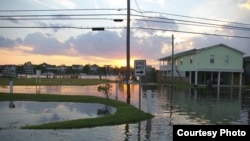A new study shows sea levels will rise higher than previously believed by the end of this century, due to rapidly melting ice from Antarctica.
Using sophisticated computer models, American researchers Rob deConto and David Pollard found that at the current rate of greenhouse gas emissions, the world's oceans would rise by close to two meters by the year 2100, and as much as 15 meters by the year 2500.
By contrast, the latest report from the United Nations' Intergovernmental Panel on Climate Change had predicted sea levels would rise just under one meter by 2100, mainly from warming seas, melting glaciers and the Greenland ice shelf.
If DeConto and Pollard's predictions, published Wednesday in the journal Nature are correct, many coastal areas, such as south Florida and New Orleans in the United States, the city of Shanghai, and Bangladesh could be seriously threatened by rising sea levels.
The pair studied two earlier periods of global warming - dating back three million years ago and 125,000 years ago - to discover how and why the melting of the icy southern continent occurs. They found the icy mass could become unstable due to water pooling on top of Antarctic ice sheets, causing them to break up, as well as the collapse of ice cliffs that rise far above sea level.












